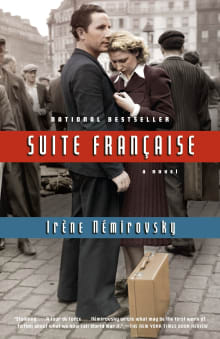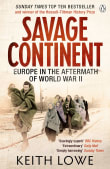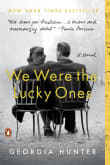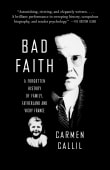Suite Française

Book description
In 1941, Irene Nemirovsky sat down to write a book that would convey the magnitude of what she was living through, not in terms of battles and politicians, but by evoking the domestic lives and personal trials of the ordinary citizens of France. She did not live to see her…
Why read it?
11 authors picked Suite Française as one of their favorite books. Why do they recommend it?

An abiding theme within my own book is that love and friendship can supplant racial and cultural differences, and this book, set in a village in France during the 2nd World War, highlights a growing and reluctant friendship between an occupier and the occupied.
The hatred that invasion induces causes any fraternisation to be labelled ‘collaboration.’ Sometimes it is. Sometimes, it is just people caught out of context seeking comfort and normality.
It is easy for those whose countries have never been occupied to scoff at the behaviour of those who had to live in the atmosphere and the reality…
From David's list on wartime books about families torn apart by the conflict in WW1 and WW2.

I’ve chosen this book not just for the incredible picture it paints of German occupation, but for the story of its survival. Irène Némirovsky was a Ukrainian-Jewish author living in Paris with her young family until she was denied French citizenship and forced to flee to the French countryside. In July 1942 she was arrested during a period of vicious roundups by the Germans and transported to Auschwitz, where she died a month later from typhus. Irène’s two daughters were amongst the crowd that gathered daily outside the Hotel Lutetia in Paris, where returnees from concentration camps were processed after…
From Sarah's list on formidable females in Nazi-occupied France.

Nemirovsky never had a chance to finish what was to be a five-part series of novellas about life in France during the German occupation, because she was arrested for being Jewish and sent to Auschwitz, where she was killed. You might imagine that it would be hard for fiction to live up to such a dramatic backstory, but the two surviving novellas are beautifully written illustrations of a society facing catastrophe.
From Janet's list on women’s experiences of World War II.

This book immediately took me to Paris during the occupation, an atmosphere I was looking to recreate for my own novel. The mess of defeat, hypocrisy, cowardice, courage, and compromise is brilliantly portrayed, but there is also hope and love, and this is what made it stand out as a tender, human story. Though a work of fiction, it was written by a Jewish woman who was arrested and murdered by the Nazis in 1942.
From Ruth's list on living with the enemy.

Part I ("Storm in June") of Némirovsky's unfinished masterwork novel is a contemporaneously written, nearly comprehensive representation of refugees' experience on the road, though a fictionalized one. But its main subtext—that to many refugees the crisis seemed to portend civilizational collapse—is not fiction.
From Austin's list on the refugee crisis in Western Europe in WW2.

This is the only work of fiction on my list, and the story of the book is perhaps even more moving than the story in the book. Conceived as a symphony, but in five movements, only two were completed, and the unfinished work’s journey between 1942 and its eventual publication in 2004 is another story of a manuscript in a suitcase, but this time with a very different outcome.
Irène Némirovsky arrived in France in 1919 after fleeing the Russian revolution with her Jewish family. Irène began writing fiction in French, and within ten years, she was a celebrated writer…
From Colin's list on France through foreign eyes.

This made a huge splash when it was first published in 2004, with some controversy over its fact/fiction status and how to read it. Written by a novelist of Russian-Jewish background, it moves from the exodus from Paris as German forces approached in 1940 to life under German occupation in provincial France. It is the more poignant because Némirovsky was deported and died in Auschwitz in August 1942. Made into a film in 2014.
From Robert's list on France in the Second World War.

Murdered at Auschwitz, Irène Némirovsky left this quietly stunning novel behind as a testament to her remarkable talent. Hidden in a suitcase among her daughter’s things for sixty-four years, the novel wasn’t published until 2004. Actually two related novels, the first part tells the story of Parisians fleeing the invasion of the Germans in 1940. With a poet's insight and sharp clarity, Némirovsky presents not only German brutality but the selfishness and foibles of human nature, including the French. In the second part the French learn to live with—and in one case, fall in love with—their oppressors. A complex, multifaceted…
From Michael's list on WW2 that breathe new life into a subject.

A very moving story set in France in WWII where the Jewish author herself became a victim of the holocaust and the second part of her story was written from manuscripts that had been hidden with her daughters. The family had to try to flee the Nazis, along with others and the book is haunting in its reality of how they all tried to survive the fear, atrocities, and hardship.
From Annemarie's list on set in France and recommended by a Francophile.

Némirovsky, a successful author before WWII, never saw her final book published. As Jews, her family fled Russia during the civil war, the writer later establishing her career in France and living with her husband and young daughters. While writing this work of fiction, which describes the fleeing of people to the French countryside and life under German occupation, she was also living through such events. The next part of her planned series played out in real life. Due to the Nazi laws for Jews, Némirovsky had been unable to gain French citizenship and her earlier conversion to Catholicism was…
From Gemma's list on WW2 occupation, resistance, and the aftermath.
Want books like Suite Française?
Our community of 12,000+ authors has personally recommended 100 books like Suite Française.


























